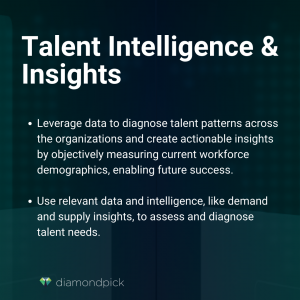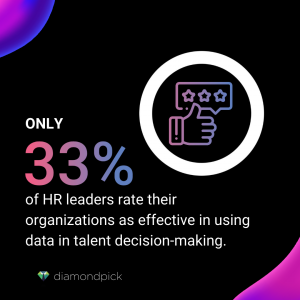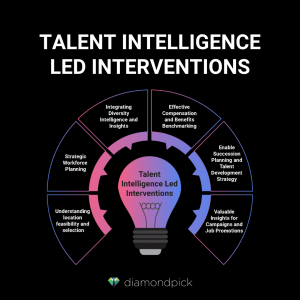In today’s ever-evolving business landscape, staying ahead means adapting and adjusting to respond to dynamic hiring requirements. With talent intelligence, rich data analytics, and actionable insights, talent acquisition leaders are not just making informed hiring decisions but also driving strategic business actions. Discover how Talent Intelligence is the key to staying competitive in our latest blog article.

Talent Intelligence and Insights
Talent Acquisition leaders are forever adjusting their strategies to stay ahead of the curve and to respond to fluctuating hiring needs. Talent intelligence is fast becoming a critical BAU function to design and plan the talent sourcing strategy. It offers a competitive advantage by using data analytics, insights and actionable intelligence to drive business decisions. It allows talent and HR teams to play a more strategic role, giving them the credibility to be involved in business strategy decisions, earning them a coveted ‘seat at the table’ with a part to play in business strategy decisions. Talent Intelligence is no longer considered a value-add but a prerequisite to an organization’s talent-sourcing strategy.
Talent Acquisition leaders have access to rich talent intelligence like:
- Demand level insights that include geographies/companies/job with the highest hiring propensity,
- Supply level insights like talent and skill availability based on location/demographics,
- Labour market insights, compensations trends, and ever-evolving candidate preferences.
Strategic talent intelligence is about mining, consolidating, and leveraging this data strategically to drive successful recruitment decisions.

For organizations to successfully leverage talent intelligence, it’s important to first understand the mechanisms of the hiring decision. Next identify what data is required to drive that decision, and what are some of the key parameters? For example, Is it talent supply? Is it the demand? Is it cost? Or is it the competition? Once these parameters are identified, use relevant intelligence to assess and diagnose talent needs, to effectively drive business action.
Tracking talent intelligence metrics at your organization will help you better evaluate your company’s talent needs, choke points, and what is required for optimal hiring.
Talent intelligence is rapidly becoming one of the most crucial solutions helping hiring managers make informed decisions to identify who the best candidates really are, where to look for them, and how much they would cost. And if you already possess extraordinary talent, how to nurture and retain them. It has the potential to deliver a major strategic business impact helping HR leaders stay ahead of emerging trends, make strategic talent decisions, manage costs and reduce employee turnover rates.

Talent Intelligence Led Interventions:
Key Takeaways:
- Leverage Talent Intelligence to get better visibility of your talent pool to help identify pain points – like skill gaps, talent demand, etc. – to make more informed hiring decisions
- It is important to build a culture of continuous learning, it can be through data analysis, visualization, project management, stakeholder engagement, presentation, etc.
- Leverage data to diagnose talent patterns across the organizations and create actionable insights by objectively measuring current workforce demographics enabling future success.
- Use relevant data and intelligence like demand and supply level insights, to assess and diagnose the talent needs.
In today’s data-driven world, Talent Intelligence is the key to unlocking your organization’s potential. Don’t miss out on the opportunities it has to offer. Download our 2023 Talent Playbook and equip your organization with the knowledge to stay ahead in the world of talent acquisition. Download your copy now!
